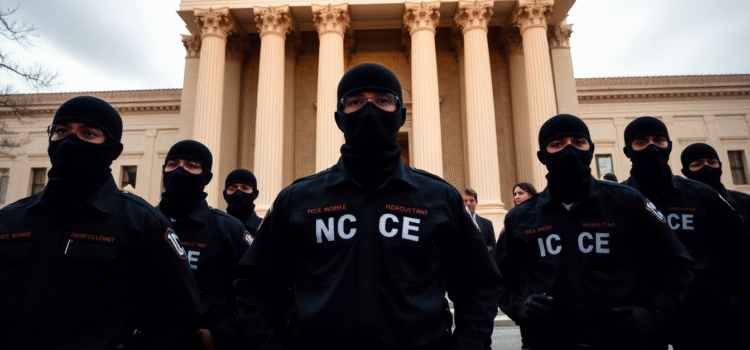
Masked ICE Agents at Courthouses: A Violation of Due Process?
Across the United States, the presence of masked Immigration and Customs Enforcement (ICE) agents at courthouses has become a focal point of criticism. A report by the Immigrant Defense Project has documented 1,070 instances of ICE arrests or sightings at courthouses from 2018 to 2019. Such operations have been criticized by immigrant advocacy groups as a violation of due process rights. Critics argue that these activities create a chilling effect, deterring immigrants from attending court proceedings and undermining both justice and public safety. This article examines the multifaceted implications of ICE courthouse operations and the responses from various stakeholders.
Origins of the Controversy: ICE Courthouse Operations
The deployment of ICE agents at courthouses has escalated significantly in recent years. These operations often see agents in masks to possibly disguise their identity, instilling fear among those vulnerable within immigrant communities. Legal experts argue that such tactics contribute to a climate of fear that ultimately deters individuals from seeking necessary legal redress or participating in court proceedings. This raises substantial concerns about the accessibility of due process and the fairness of legal proceedings.
Impact on Immigrant Communities: Fears and Due Process Violations
Immigrant rights organizations point out that ICE courthouse arrests disproportionately affect communities of color and lead to a breach of due process rights for immigrants. The fear of encountering immigration enforcement in a place meant for justice discourages many from seeking legal protection or reporting even violent crimes. This phenomenon could lead to severe consequences, not just for the individual litigants, but also for broader community safety and trust in the justice system.
Legislative Responses: Efforts to Curb ICE Courthouse Activities
In response to widespread ICE criticism in courts, numerous states including New York and Washington have introduced legislation aimed at restricting ICE activities in courthouse vicinities. These legislative measures seek to preserve the integrity of the legal process and ensure that courthouses remain safe and accessible to all, irrespective of immigration status. Such state-level interventions highlight a growing demand for sanctuary courthouses that protect immigrant rights in court settings.
Critiques and Legal Challenges to ICE Courthouse Practices
- Racial Profiling Concerns: The American Civil Liberties Union (ACLU) argues that ICE practices may involve racial profiling, disproportionately targeting people of color.
- Legal Challenges: Several legal aid organizations have challenged ICE’s tactics, arguing that they contravene basic legal rights available to every individual, regardless of immigration status.
The Call for Comprehensive Reform in Immigration Policy
There is an increasing call for reform in immigration policies related to legal proceedings. Advocacy groups contend that a holistic approach is necessary, one that focuses on protecting due process rights for immigrants and ensuring fair and impartial hearings in courthouses nationwide.
Conclusion
The deployment of masked ICE agents at courthouses presents significant questions about the protection of due process rights for immigrants and the overarching principles of justice and fairness. Stakeholders ranging from immigrant rights groups to legal experts continue to stress the importance of reforms that prioritize human rights and the integrity of legal proceedings. Readers are encouraged to reflect on these critical issues and engage in a discourse that fosters understanding and change.
Sources
1. Immigrant Defense Project: https://www.immigrantdefenseproject.org
2. American Civil Liberties Union: https://www.aclu.org
Frequently Asked Questions
What are the key criticisms of masked ICE agents at courthouses? Such operations are often criticized for violating due process rights of immigrants and creating a climate of fear that deters participation in legal proceedings.
How do ICE courthouse operations affect immigrant communities? These operations can lead to racial profiling, discourage crime reporting, and undermine trust in the legal system among immigrant communities.
What legislative actions have been taken against ICE courthouse deportations? States like New York and Washington have enacted laws to restrict ICE activities in courthouses to protect legal rights and access to justice.
Why are masked ICE agents considered a due process violation? The presence of masked agents can intimidate immigrants, potentially inhibiting their ability to engage with the legal system fairly and without fear.








Comments